Second Arrest Of Iranian Dissident Rapper Sparks Outcry
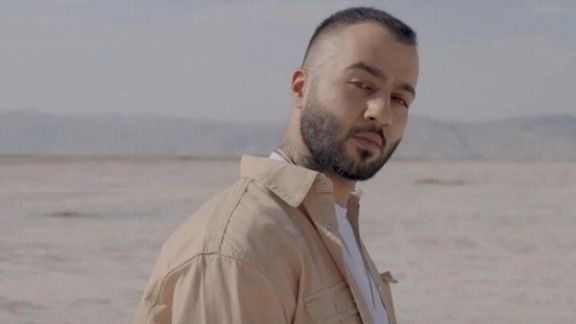
The re-arrest and violent detention of Iranian rapper Toomaj Salehi have ignited widespread condemnation and concern.

The re-arrest and violent detention of Iranian rapper Toomaj Salehi have ignited widespread condemnation and concern.
Social media users described his arrest earlier this week as a "kidnapping" and a manifestation of the regime's fear of Salehi's outspokenness as a protesting rapper.
Salehi, 33, was detained by plainclothes on a street in Babol, located in the north of Iran, on Thursday. He was subsequently transferred to an undisclosed location. Salehi's X page reported that the arrest took place without any judicial order and involved "severe physical abuse," with officers allegedly beating him using the butts of their AK-47 rifles and pistols.
The incident comes after Salehi spent over a year in prison, with 252 days in solitary confinement. He had been released on bail on November 18th. In response to his re-arrest, social media users initiated a trending campaign on Friday, with more than 75,000 mentions of Toomaj Salehi on the X social network. Many posts questioned his whereabouts.
Ye-One Rhie, a representative in the German parliament and Salehi's political sponsor, urgently called for his release in a video message. Rhie emphasized the importance of shedding light on the actions of the Iranian regime, stating, "Everyone needs to know what the Iranian regime is doing, that it is not abiding by its own constitution and kidnapping people for no reason."
Salehi gained prominence as an artist known for his protest songs addressing social issues and government injustices in Iran. The 33-year-old rapper was initially arrested on October 30th 2022, as part of a broader crackdown on regime's political opponents.
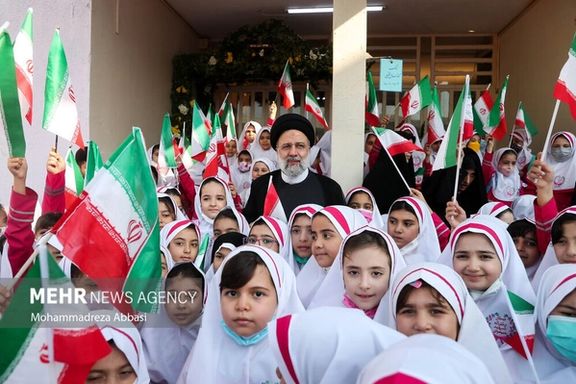
Policies adopted in recent years have seriously damaged the quality and fairness of Iran’s education system, a report released by a group of experts says.
The report an excerpt of which was published by the reformist Etemad newspaper highlights significant qualitative deficiencies in Iran's education system. Alongside these shortcomings, the system is criticized for a lack of justice in providing educational opportunities and a legitimacy gap, stemming from disparities between students' expectations and authorities' ideological perspectives.
According to the report, this disconnect has severed ties between the educational system and civil society, leading to resistance from students, their families, and even teachers against the system's policies. The study group, comprised of experts, researchers, and educators, convened at the invitation of former reformist president Mohammad Khatami (1997-2005) to address these issues.
“The education system has turned into an arena for those in power to pursue their political goals,” the report says, explaining that schoolbooks and teacher training and selection have become engineering tools to ensure the political and ideological goals.
The report contends that the accelerating privatization of education in Iran has disproportionately disadvantaged poorer regions, with some areas, like Sistan- Baluchestan Province, having villages located up to fifty kilometers from the nearest school. Schoolbooks, first re-written after the 1979 revolution, have been modified over the years to align with Islamic standards, have increasingly become tools to serve the political interests of the hardliners in power, imposing their ideological values.
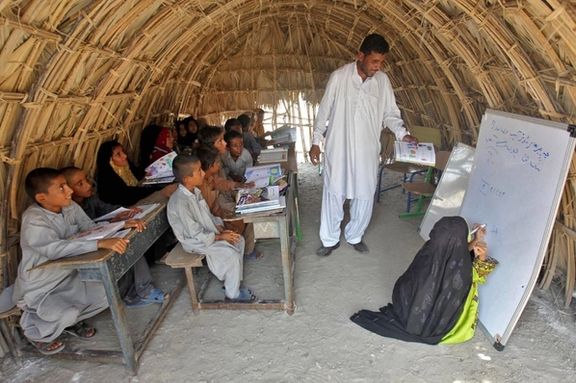
Religious censorship has invaded many textbooks, including literature and history, where the hardliner Shiite faction has imposed its own version of values on the educational system. Some writers and poets have been purged from textbooks while others have been given a more prominent place. Even Islamic history has been manipulated to fit the narrow religious agenda of the ruling hardliners.
In recent weeks, reports indicate that hardliners controlling parliament and enjoying influence in the presidential administration, have begun hiring thousands of their followers as teachers and school principals, without any consideration for qualification.
Resistance against the ideological values of the hardliner clerical rulers clearly manifested itself last year during the several-month-long Woman, Life, Freedom protests when female students displayed their anger by refusing to wear the mandatory hijab and protested both inside and outside schools in many areas of the country. Some of the students who were arrested for protesting were banned from attending school.
Many Iranians suspect the mysterious poisoning incidents that affected thousands of students across the country following the protests were orchestrated as revenge by the regime or the religious hardliners it protects. This was perceived as a measure to intimidate and subdue those involved in the protest movement. The poisonings began in Qom on November 30, spreading nationwide until April, leading to hospitalizations and at least one reported death.
Authorities first denied any suspicious activity, then admitted “mild poison attacks”. Later they blamed dissidents and foreign powers and arrested some individuals who they blamed for isolated cases and forced to make televised “confessions”.
Eventually in a statement on April 28, the intelligence ministry denied any indication that poisonous substances had caused the illness of students and said samples taken from the scene of the incidents examined by “the most reliable laboratories” in the country had not yielded any suspicious materials. The ministry blamed pranksters who it claimed had used stink pots, pepper sprays, tear gas and similar substances to disrupt classes.
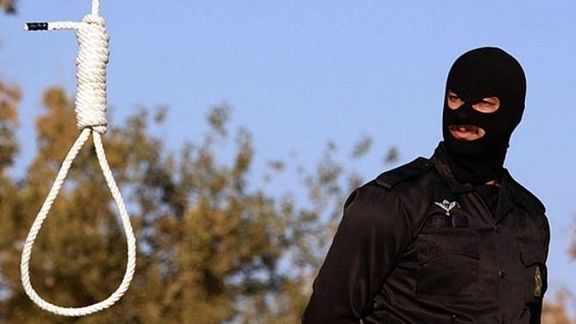
Iran has executed two more political prisoners, one from a 1980s case and another detained during the mass protests in November 2019.
Norway-based Iran Human Rights (IHRNGO) identified the 2019 protester as Kamran Rezaei, who was hanged in Shiraz Central Prison (Adel Abad). The 32-year-old protester was arrested during the November 2019 nationwide protests and sentenced to ‘qisas’ (retribution-in-kind) for the murder of a Revolutionary Guard (IRGC) officer. It is not clear whether he had other charges like ‘moharebeh,’ an obscure Islamic term that means“war against God” that could potentially lead to the death penalty.
Citing an unnamed source, the IHRNGO said, “Kamran Rezaei was arrested for killing a basiji (IRGC paramilitary volunteer forces) with a machete during the November 2019 nationwide protests. He was held in solitary confinement for seven months and forced to make self-incriminating confessions under torture.”
The other prisoner who was executed this week was Geda-Ali (Hormoz) Saber Motlaq, a member of the exiled opposition group Mojahedin-e-Khalq (MEK) and was hanged in Rasht Central Prison on 25 November.Motlaq, who was 62 years old at the time of his execution, was arrested in 1981 on charges of membership in the MEK and the alleged assassination of an Islamic Republic official. He was released due to lack of evidence and left Iran. He returned to the country in 2021 and was detained for the same charges. Despite no new lead or evidence in his case, he was sentenced to death.
Earlier this week, protester Milad Zohrevand, who was arrested at the 40th day anniversary of Jina (Mahsa) Amini, was executed in Hamedan Central Prison and Kurdish political prisoner Ayoub Karimi in Ghezelhesar Prison.
On November 2, the UN published a report stating that the Islamic Republic executed at least 419 individuals in the first seven months of the current year. This figure represents a 30% increase compared to the same period in 2022.
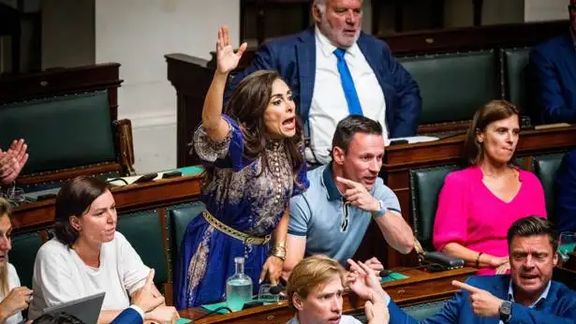
The Belgian police are beefing up security measures to protect Darya Safai, an Iranian-born member of parliament, following death threats she received on social media.
In an interview with Iran International, Safai said that the death threats against her have increased following the Israel-Hamas conflict.
“I should be careful and report any suspicious events around me” to the police, the lawmaker wrote on X.
The police has launched a probe into the nature and sources of the threats.
Safai blamed Islamists for the threats, vowing that she will continue to stand up for freedom.
“It’s incomprehensible that people should make serious threats … instead of responding with substantive arguments. But that is just how Islamists operate,” read her post on X.
Speaking to Iran International, she accused the Iranian regime of orchestrating the threats by promoting Islamist extremism in Belgium and the whole of Europe.
Safai warned that Tehran is trying to target its opponents indirectly under the guise of backing the Palestinian cause.
The alarming rise of extremism and antisemitism have raised serious concerns among European countries, with many of them blaming the Islamic Republic for fostering such activities.
In October, The Times warned that Iranian agents are stirring up unrest in the UK through Gaza protests.
There is direct involvement of the Iranian regime through the physical presence of operatives at protests as well as through disinformation campaigns conducted online, the newspaper said.
Earlier in November, German authorities executed raids on 54 locations connected to the Islamic Center of Hamburg (IZH), suspected of supporting Iran-backed Hezbollah.
On November 4, Safai condemned attempts to silence her with the label of “Islamophobe,” especially since the current conflict began in the Middle East.
“What the world is experiencing today is much broader than a war between Israel and Hamas. It is a broad war that shows the direction for certain Muslims to ultimately achieve their goals,” she said earlier this month, highlighting the Muslims’ promised goal to conquer the world and establish an Islamic rule.
Last November, Iran International was warned by London Police that its journalists were under threat from Iranian agents and the police took measures to strengthen security around the network’s offices. A man was arrested in the vicinity of Iran International’s headquarters in February and charged with a terrorism offence.
Safai has been one of the most vocal European lawmakers critical of the Islamic Republic, advocating a tougher stance towards Tehran and its regional and international policies.
She is also one of the staunch supporters of listing Iran’s Revolutionary Guard (IRGC) as a terrorist organization.
Safai told Iran International on Thursday that she has been under police protection since June after she criticized a formal invitation extended to Alireza Zakani, the mayor of Tehran, to visit Belgium. Her criticism angered Iranian officials, with some reports saying that they might try to target anti-regime activists and figures who openly opposed Zakani’s visit.
Tehran’s mayor was a hardliner member of parliament before becoming a candidate in the 2021 presidential election and withdrawing in favor of the current president Ebrahim Raisi. He also served as the head of IRGC’s Student Basij paramilitary forces and had a prominent role in cracking down on students during popular protests in July 1999.
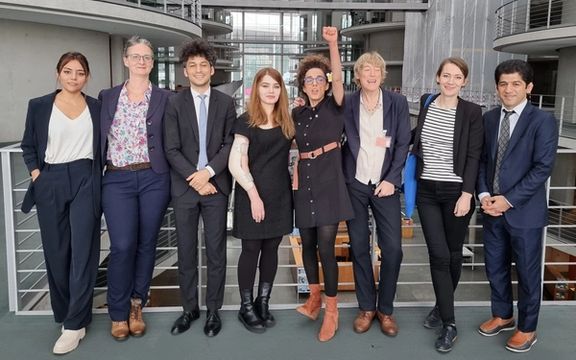
The prominent Iranian-American dissident Masih Alinejad on Thursday blasted the German government for seeking to impose a gag order on her meeting to discuss the repression of women in the Islamic Republic.
Alinejad took to X to slam the crackdown on the dissidents’ free speech, stating, “Today I walked out of a meeting with the German government because they tried to censor me. I had a meeting with officials in the German Foreign Ministry. But I was told the meeting had to be kept secret and I couldn't mention it in the media or write about it on my social media. I tried to convince the officials to publicly meet with Iranian delegation that included @simamoradb51053 young woman who had been shot during the Woman, Life, Freedom revolution last year.”
She added, “ When the ministry officials insisted on keeping the meeting a secret, I walked out. I am a women’s rights activist and I stand for transparency. How ironic that German government, with its feminist foreign policy, wants to meet with other feminists but only in secret. The German government is practicing victim blaming. I’ve heard some German officials say I’m too radical and meeting me publicly would be fatal to their Iran policy.”
According to Alinejad, “If standing up for women’s rights and wanting an end for gender apartheid regime in Iran is being radical, then I’m proud to be labeled as such. The German government is helping the Islamic Republic to silence dissidents. I refuse to play their game.
Earlier this week I had many constructive meetings with parliamentarians and ministers from different parties. I have high hope that they can be allies of Iranian women.”
The German MP Norbert Röttgen, who has been spearheading a campaign to sanction Iran’s Islamic Revolutionary Guard Corps and secure the release of German hostages held in Iran, wrote on X about Alinejad. "While this woman is brave enough to take on the Islamic regime of Iran, the Foreign Office is too cowardly to publicly stand with her. Unbelievable and shameful!”
When asked about Alinejad’s criticism of the German government, a spokesperson for Germany’s foreign ministry sent Iran International a statement from Luise Amtsberg, the Federal Government Commissioner for Human Rights Policy and Humanitarian Assistance.
The Green party politician Amtsberg, said “I was looking forward to an open and honest exchange with Masih Alinejad today. I invited her to the Foreign Office. Confidentiality was agreed upon in advance. Both sides have agreed to this framework.
In my experience, conversations that take place confidentially are more substantive - especially when it comes to individual fates. This also encourages people to contact me confidentially.”
Amtsberg added “I very much regret that Ms. Alinejad linked a conversation to the publication of the content of the conversation and broke off the discussion at the beginning. I'm sure we would have had a good conversation.”
The commissioner continued that “My door is always open to activists and civil society. I would have loved to know more about Sima Moradbeigi's story, who accompanied Ms. Alinejad. I will continue to call out the Iranian regime’s serious human rights violations and support Iranian civil society.”
Iranian dissidents have accused Germany’s government of a soggy appeasement policy toward the Islamic Republic of Iran.
Germany refuses to sanction the IRGC as a terrorist movement. The Wall Street Journal famously wrote a series of editorials in 2008 titled “Germany loves Iran” about Berlin’s efforts to enable trade with Iran. Germany continues to retain a flourishing trade relationship with Iran, permitting its banks to make vital transactions to Iran. In 2022, German companies earned over $1billion in trade from Iran.
Iran International reported in August that the giant German engineering multinational Bosch sold 8,000 surveillance cameras to Iran.

Police in Tehran have been impounding cars in the latest crackdown against ongoing hijab violations.
Iranian officials confirmed the issuance of police warnings through text messages, alerting citizens to the imminent seizure of vehicles for failing to adhere to compulsory hijab rules. The police directive reportedly extends to over a million citizens, with hundreds of cars confiscated and temporarily prohibited from use.
Amidst a growing crackdown on hijab defiance, Iranian parliamentarians have expanded the government's Hijab and Chastity bill. The proposed legislation, seeking stricter penalties for hijab infractions, faces widespread criticism from human rights groups.
The intensified enforcement of hijab regulations follows protests that have swept across Iran since the death of Iranian-Kurd Mahsa Amini last year. Amini's arrest in Tehran, allegedly for breaching the Islamic republic’s mandatory hijab, ignited the worst uprising of recent history.
Women across the country have been defying the mandatory hijab which has been met with a heavier presence of hijab enforcers in public spaces such as subway stations. Additionally, surveillance cameras have been installed to identify and apprehend individuals violating hijab regulations.
Tweet unavailable